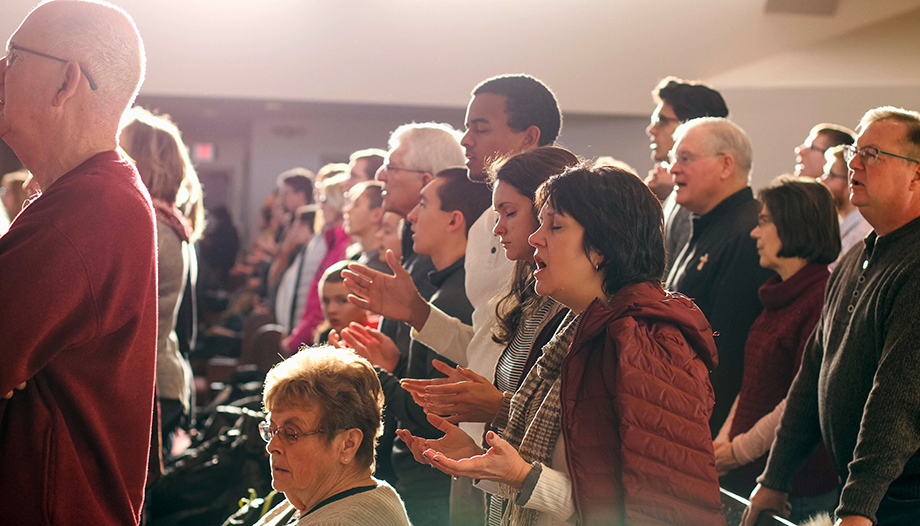I recently learned that the "doomscrolling"is frequent enough to worry doctors and therapists. It is an obsession with negative news on social networks, a strange desire to feel good about feeling bad.
Certainly, problems abound, and on all sides. War, the economy, family disintegration, demographic collapse, loss of religious adherence and the sense that the West is decadent, with Catholics entangled in that decadence. It is all too easy to find bad news, even bad news about the Church.
On the other hand, we have always had problems. I am consoled to remember that the first person to receive the Eucharist was Judas Iscariot. More than a triumphal story, the Last Supper has betrayal etched into its core and foreshadows the agonies of the Garden and the Cross. Christianity is not a fairy tale, and the Incarnation brings redemption, but also the suffering of Christ. Indeed, he promised us our own crosses.
It is not by chance that Jesus is tempted to make things easy and secure. Bread, signs, peace, that is, prosperity, certainty and security. In many ways, the modern project promised a secure and prosperous world thanks to the certainty of science. If, as Francis Bacon asserted in his New OrganIf we were to free ourselves from superstitions, turning to human power to produce and control, we could progress toward heaven on earth, improving human fortunes forever. Or, as the Grand Inquisitor from DostoevskyChrist offers freedom, but what we want is bread. What Jesus experienced as temptations, modernity has claimed as good news.
As modern men we experience a security, certainty and prosperity rarely enjoyed throughout history. Much of this is good, of course. No prudent person looks favorably on famine or war. But perhaps we have confused realms and assume that the admirable progress in science, technology and medicine carries over into the realm of human freedom.
To the mastery of our actions, of our loves, of our spirit and, therefore, also of our sins. If science can bring health and prosperity, why can it not overcome the lust of the flesh, the lust of the eyes and the pride of life?
When human reality stubbornly resists technological solutions, many give in to three errors. For those who have become rationalists, convinced that there is a solution to all human problems, two errors appear: first, a doubling of rationalism, a willingness to sacrifice freedom and people to technology, convinced that all we have to do is try a better solution; second, a desperate resignation that the arc of decay and decline is already permanent and inexorable, and the only thing to do is to wait for the end.
Third, others embrace a kind of ahistorical fundamentalism, bent on living in a world that no longer exists (if it ever did) and who see the Church as an escape route, a place of safety when the world seems to be burning with many problems.
However, to the Catholic mind, forms of rationalism and fundamentalism have no appeal because we have hope infused in us through our baptism and the gifts of the Holy Spirit. If we despair, throwing up our hands and concluding that nothing can be done, we have lost hope. If we blithely whistle happy tunes, indifferent to challenges and suffering, we are guilty of presumption.
Instead, God gives us hope and asks us to maintain it, because we know that there is another, God, for whom nothing is impossible and who does not want anyone to perish. Christ did not come to condemn, but to save (Jn 3:17) and, above all, that there is another who acts in our world and who does not take away our freedom and responsibility, but gives us even more freedom and responsibility, as well as the necessary grace.
Our tradition understands that hope is a virtue. The virtues do not diminish the human being, but make us more perfectly human as well as making us friends of God. Hope is not a mere personality trait, but a disposition to think, choose and act as one should.
Our times need Catholics to be good Catholics and good human beings. The Catholic mind is hopeful not because it relies on rationalism; nor does it retreat to some ecclesiastical refuge. The Catholic mind is hopeful because there is a God who promises that his will will will be done, and he wills good.
The Catholic mind also knows that the way of God's purpose includes the Cross, and it cannot avoid the Cross, it cannot reach its purpose by any other easier way. Therefore, while we lament over so much bad news, so much terrible news, we do not despair.
Editor-in-Chief of The Public Discourse.








